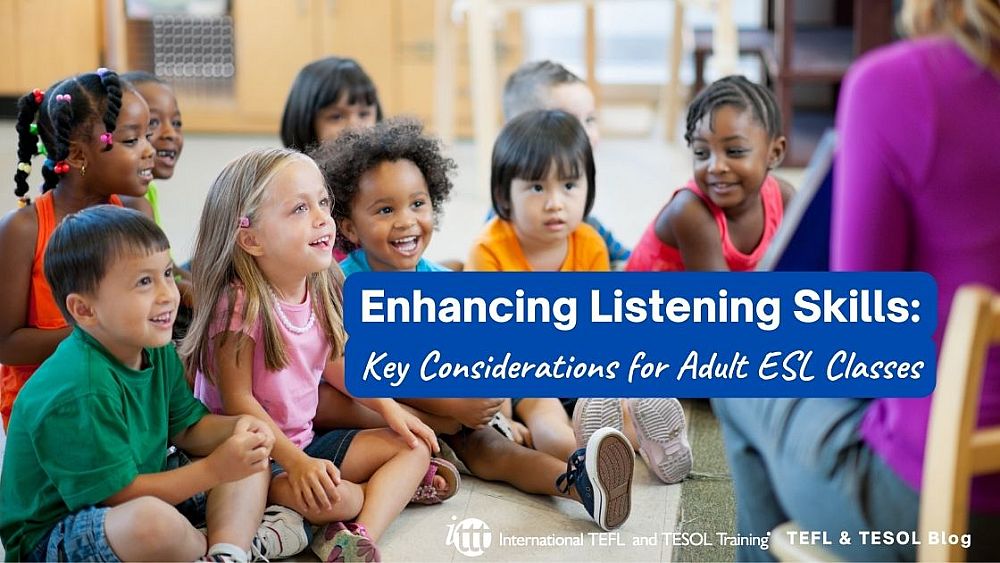Enhancing Listening Skills: Key Considerations for Adult ESL Classes

Listening is possibly the least covered of the four skills needed by ESL learners in most classrooms. As it is a fundamental skill, teachers should try to create as many listening skills lessons as they do for the other three skills: reading, writing, and speaking.
Table of Contents
Challenges of Listening Compared to Reading
The Receiving Stage: Hearing and Attending
The Understanding Stage: Decoding and Comprehension
The Evaluating Stage: Forming Opinions and Thinking Ahead
The Remembering Stage: Processing and Storing Information
The Responding Stage: Verbal or Written Answers
Are you ready to teach English as a foreign language?
Check out what our course grads say in our many video testimonials!
Challenges of Listening Compared to Reading
Listening is often a much more difficult task for students than the other receptive skill of reading. This is because usually when reading, we have time to go back and forth over the text. If there is something we don't quite get the first time around, we simply go back and look again. In most natural listening situations, this is not possible. When speech flows into our ears, it passes through and is gone. We can't rewind what someone is saying to get a clearer idea of what they mean. Before creating a listening skills lesson, it is important to understand a few basic features of how and why we listen to language.
The Stages of Listening
The stages of listening are crucial in the process of comprehensible language input. Understanding these stages helps in designing effective listening lessons.
The Receiving Stage: Hearing and Attending
The first stage of the listening process is the receiving stage, which consists of hearing and attending. Hearing is the process of sound waves hitting the eardrum and being registered, while attending is when we identify and interpret particular sounds we hear as words. Receiving is an active process that constructs meaning from both verbal and nonverbal sounds.
To optimize the listening activity, the audio quality must be of high quality to ensure hearing is not impaired. Additionally, background disturbances, such as noise, should be minimized to avoid affecting the attending process.
The Understanding Stage: Decoding and Comprehension
The understanding stage is when the listener discerns context and meaning from the words that are heard. Understanding or comprehension occurs when the listener's understanding of the context and meaning of the words matches the speaker's message.
To determine the success of the understanding stage, questions should be asked during the lesson to gauge comprehension. Carefully chosen questions will demonstrate whether the listener has grasped the context and meaning of the listening passage.
The Evaluating Stage: Forming Opinions and Thinking Ahead
The evaluating stage involves assessing the information received and forming an opinion. Listeners may also start thinking about a response. This stage can only be effective if the listener fully understands what the speaker is trying to say.
To ensure the listener has understood the information, targeted specific questions should be asked. These questions should be directly related to the listening passage and have a single unambiguous answer. Pairwork activities can be used to facilitate discussion and verification of answers.
The Remembering Stage: Processing and Storing Information
If the listener has attended, understood, and evaluated the information, it will likely be stored in their memory for later recall. This storage process occurs during and after the speaker's delivery.
Headline 11: Time Considerations for Effective Recall
The drop-off time between hearing the information and properly processing and storing it should be considered. To facilitate effective recall, the listening activity should not be too long, making memorization difficult. Additionally, there should not be too much time between receiving the information and being asked to recall it.
The Responding Stage: Verbal or Written Answers
The responding stage is when the listener provides verbal or written answers based on their short- or long-term memory. This stage relies on the successful completion of the previous stages.
Incorporating pairwork activities in listening lessons reduces the stress of individual performance and allows students to formulate responses based on shared memories of the listening passage.
Are you ready to teach English as a foreign language?
Apply now & get certified to teach english abroad!
Speak with an ITTT advisor today to put together your personal plan for teaching English abroad!
Send us an email or call us toll-free at 1-800-490-0531 to speak with an ITTT advisor today.
Related Articles:
- Top 10 Cities in Europe with the Highest Demand for English Language Teachers
- 5 Reasons To Take A TEFL Course Right Now - Even If You Are Not Leaving Yet | ITTT | TEFL Blog
- All the Documents You Will Need to Teach English Abroad
- The Impact of Positive Motivation on an ESL Classroom
- You're Never Too Old to Change Your Life and Do a TEFL Course | ITTT | TEFL Blog
- Getting Student Placement Right - The Best Desk Arrangements for EFL Students



